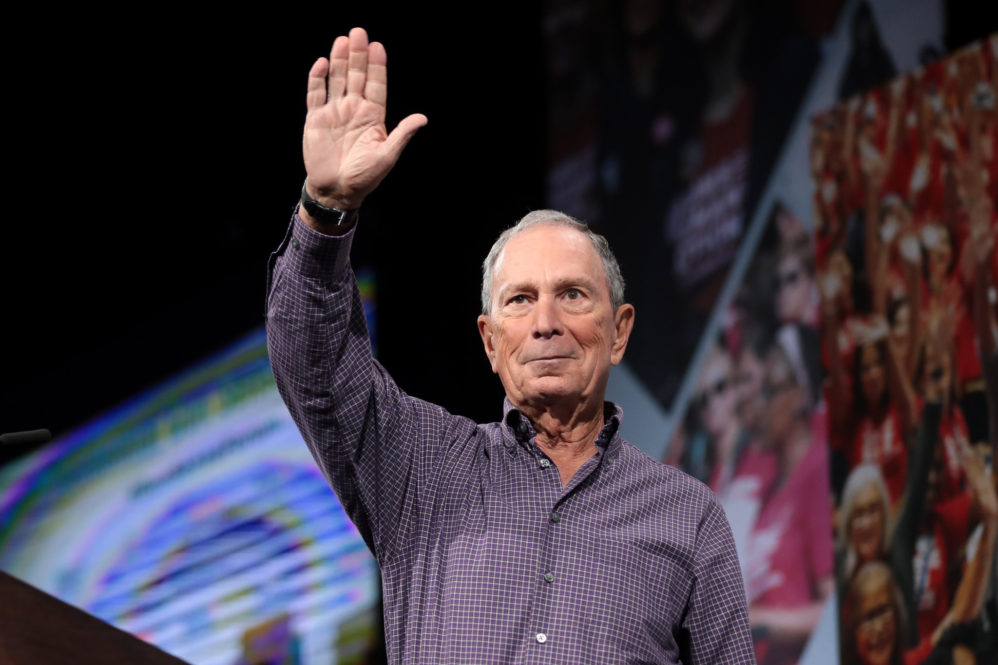Can Michael Bloomberg Do Better Than Joe Biden At Pretending To Be A Moderate?
Does Biden's weakening campaign open the race up for another supposed moderate?

On Monday afternoon, reports surfaced that former New York City mayor Michael Bloomberg was considering throwing his hat into the ring for the 2020 Democratic nomination. These recent accounts indicate a change in sentiment from the tycoon, who, in a Bloomberg editorial back in March, expressed that he would not be seeking the Democratic nomination.
Bloomberg’s renewed flirtation with a run suggests many in the Democratic establishment are increasingly wary of how the party’s far-left takeover will look to voters amidst the wavering campaign of former vice president Joe Biden, whose dismal third-quarter fundraising numbers may account for some of the alarm.
The numbers, reported on Monday, were less than impressive for Biden, who landed in a distant fourth, behind Bernie Sanders, Elizabeth Warren, and Pete Buttigieg. While his two top competitors, Sanders and Warren, successfully raised $25.3 million and $24.6 million, respectively, Biden managed to secure only $15.2 million.
In many ways, Biden has represented the only compromise option the progressive wave anxious to flood the party. He earned his woke stripes as the vice president for the farthest-left president in U.S. history. Despite being firmly embedded in the establishment for decades, and his current stances reflect this uncomfortable (and perhaps unsustainable) hybrid. He supports certain limits on abortion practices, although he recently switched positions to supporting taxpayer funding for abortions, which most Americans don’t support.
He is against the “Medicare for All” plan touted by many of the other 2020 contenders directly due to Obamacare’s failure, likely because he was part of the Obamacare-creating administration. He hasn’t yet publicly released his creative ways to tax the highest-income earners, unlike his more left-wing counterparts. And his mainstream Democrat voting record has put him perpetually on the defensive to the party’s left, despite his record of leading extreme political crusades such as the smears against Supreme Court Justice Clarence Thomas.
But Biden’s popularity is slipping. According to a Quinnipiac poll released Monday, Warren is now the frontrunner, capturing 30 percent of the vote among Democratic voters and left-leaning independents and leading Biden by a three-percent margin. Wall Street and the Democratic establishment are reportedly “bracing” for the possibility of a Warren nomination, if one accepts the assumption that Wall Street doesn’t think it can play ball with government.
But some, like Bloomberg, seem to be less accepting of the party’s fate, as evidenced by Bloomberg’s alleged renewed interest in running. Bloomberg likely envisions himself as the so-called moderate candidate to fill the centrist lane, should Biden’s campaign nosedive.
The Biden versus Warren divide highlights the uneasy marriage between establishment Democrats and their far-left, who often agree on the political end goal but patently disagree on how far left the party should position itself in the 2020 election. As The New York Times pointed out on Monday, though Warren is becoming the top contender for the Democratic nomination, she still has failed to secure a single endorsement from a governor, big-city mayor, or fellow senator outside of her home state of Massachusetts.
As Johnathan Martin notes, there’s a real “lag” between what the far-left base seems to be clamoring for and what the more moderate Democratic establishment is comfortable nominating for a general election. Nothing evinces this fact more clearly than Bloomberg’s apparent compulsion to enter the race at the first signs of Biden’s collapse.
Unsurprisingly, Bloomberg and Warren have their own political “beef,” the substance of which might offer a window into Bloomberg’s motivations for running, should he opt to do so. Indeed, the former mayor has long taken issue with Warren’s anti-corporate rhetoric, even going as far as to label her tax plan “Venezuela.” As the Wall Street Journal pointed out earlier this month, Warren’s plans to regulate everything from banking to healthcare are nothing short of radical:
No front-runner has proposed such sweeping changes to how businesses operate. A President Warren would seek to regulate big tech companies as utilities, break up big banks and split them from securities dealers, ban fracking of oil and gas, phase out carbon emission from buildings, cars and power plants in eight to 15 years, require big companies to appoint worker representatives to at least 40% of board seats, ban private health insurance and, effectively, for-profit college, and negotiate down drug prices.
Bloomberg’s uneasiness with Warren’s anti-corporate messaging is shared by others on Wall Street and in particular, big-money Democratic donors, who have warned that they are prepared to sit out 2020 or even back Trump’s reelection, should the Democrats nominate Warren.
Warren’s rise poses a real political risk for the Democrats. Despite Biden’s floundering campaign, he is widely regarded as the most “electable” candidate and the one best positioned to defeat Trump in the general election, likely stemming from his brand-name recognition and his more moderate public posture.
The Democrats are keen to nominate an open leftist and would like to beat Trump, but it’s unlikely that they can achieve both. Should Bloomberg decide to run, convincing the base to prioritize the general election over the primary will be an uphill battle, something Biden has struggled to do.
